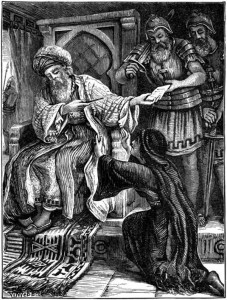Micah 6:1-8
This text is used for the Lectionary Year A on January 29th, 2017.
 One oft-repeated benefit of the lectionary is that it forces passages on us that we would not ordinarily preach. However, one fallback to this format is that it can often give passages that end up being proof-texts or at the very least commonly repeated texts abstracted from their larger context and place within the Biblical narrative. Micah 6 is one such text. More specifically, though, it is Micah 6:8 that receives the spotlight – it is well rehearsed in many a Bible drill class. That being said, the text continues to speak a particular truth that is made more evident within its wider context and within the whole of Scripture.
One oft-repeated benefit of the lectionary is that it forces passages on us that we would not ordinarily preach. However, one fallback to this format is that it can often give passages that end up being proof-texts or at the very least commonly repeated texts abstracted from their larger context and place within the Biblical narrative. Micah 6 is one such text. More specifically, though, it is Micah 6:8 that receives the spotlight – it is well rehearsed in many a Bible drill class. That being said, the text continues to speak a particular truth that is made more evident within its wider context and within the whole of Scripture.
The difficulty with this text, though, is to not allow our own vision of justice, loving-kindness, and humility override what Micah is describing. What one commentator describes as the “Golden Text” of the Old Testament begins, “He has told you, O mortal, what is good…” (Micah 6:8a). That Micah presumes the people know what is good because God has (presumably) told them indicates that it is not just any account of justice, loving-kindness, and humility that matters. One easy way to ground this and root it in the tangible, visceral world in which we live is to look at the Gospel text for this week, Matthew 5:1-12. The beginning of Jesus’s Sermon on the Mount is yet another familiar text but seen through the lens of Micah’s call to remember what God has told them reveals that this command is not only for Micah’s audience but for us as well.



 My wife is a classically trained musician and has been playing piano since she was 4 years old. I, on the other hand, had about a year of piano when I was a child, and the only instrument I am capable of operating is a sound board – a place where I have a lot of experience.
My wife is a classically trained musician and has been playing piano since she was 4 years old. I, on the other hand, had about a year of piano when I was a child, and the only instrument I am capable of operating is a sound board – a place where I have a lot of experience.